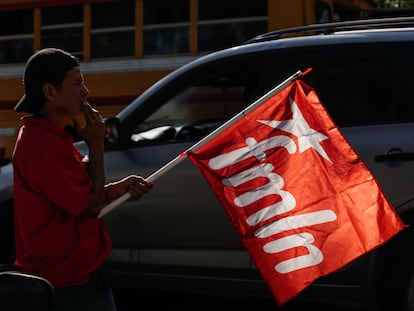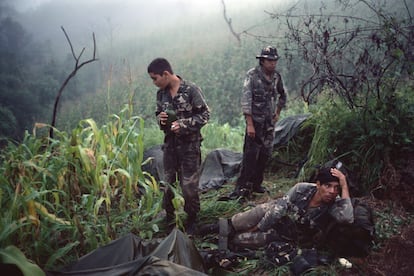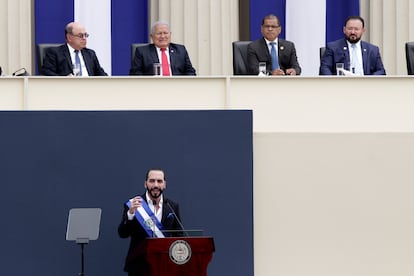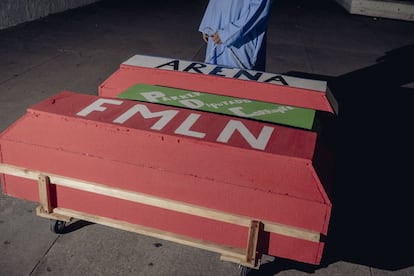The collapse of the FMLN, the former Salvadoran guerrilla movement Nayib Bukele wants to eliminate
The president, who began his political career under the wing of the leftist group, now wants to erase it from the political map, but analysts see a ‘rescue of the party’s revolutionary principles’ as possible


On the night of March 4, when Nayib Bukele was preparing to celebrate his electoral victory — in which together with his allies his Nuevas Ideas party secured control of most of El Salvador’s municipalities — the controversial president also scored a more personal triumph: the collapse of the Farabundo Martí National Liberation Front (FMLN), the former Salvadoran guerrilla organization that suffered its worst political defeat since the dawn of democracy. Bukele has been working since his first mandate to eliminate the leftist organization — of which he was previously a member and that for him represents a complicated past — and he has made great strides in that endeavor. The FMLN did not win a single municipality in the elections of early March and has been left out of the Legislative Assembly, the Salvadoran parliamentary body. It represents a significant blow for a movement that once enjoyed the sympathy of half the world in its struggle against the military tyranny that Salvadorans suffered and that, after the peace accords of the early 1990s, was reconverted into a political party, laying down its arms to participate in electoral ballots.
The FMLN was created at the beginning of the 1980s to group together the different political-insurgent factions that fought against the Salvadoran army in a bloody 13-year civil war that left more than 75,000 people dead. The leftist groups had taken up arms to overthrow the military governments that responded to the interests of a conservative and backward oligarchy that feared a Cuban-style revolution. The Salvadoran guerrillas had the backing of Fidel Castro’s Cuba, which trained and helped finance them, while Washington applied pressured to avoid an insurgent triumph at all costs. The fear was that the guerrillas would come to power as had happened with the FSLN in Nicaragua. Leftist propaganda stated that “if Nicaragua won, El Salvador will win.”
The Chapultepec Peace Accords, signed on January 16, 1992 in Mexico City, marked a political change in El Salvador, putting an end to more than a decade of civil war and initiating the path to the strengthening of an electoral democracy. The FMLN laid down its arms and became the main leftist political force. In June 2009, it achieved its greatest political triumph when it came to power for the first time under the leadership of Mauricio Funes, a 49-year-old journalist who represented the desire for change in a country hit by inequality and violence sown by the so-called maras, the gangs that practically controlled El Salvador.

Funes was followed in government by former guerrilla Salvador Sánchez Cerén, one of the main leaders of the FMLN and an incombustible politician who aroused the old fears of the business and conservative class. Both leftist governments failed to put an end to violence and poverty and are instead remembered for high levels of corruption and the eventual flight from the country of their heads: Cerén and Funes sought refuge in Nicaragua, converted into a dictatorship by Daniel Ortega. “The FMLN made pacts with shady characters in the country’s political sphere in order to govern. It also made pacts with people accused of corruption, organized crime, and drug trafficking. In addition, its political project did not provide solutions that met the expectations of people who declared themselves leftists, which provoked a strong disenchantment among citizens,” explains Salvadoran analyst César Artiaga. “People felt that revolutionary principles and leftist values were progressively betrayed by the party’s leadership.”
The dissatisfaction of the electorate with the corruption of the FMLN — but also of the right-wing Nationalist Republican Alliance (ARENA), the two parties that for 25 years shared power in the country — created the basis for Bukele to take over in the 2019 presidential elections. The young president, who sells himself as a modern, efficient, and likeable man and who moves the masses through his effective use of social networks, made eliminating the historic FMLN one of his objectives. Bukele was part of the leftist movement during his early political career and under its wing he won the mayoralty of San Salvador, the capital. “Bukele’s is a story of opportunism,” says Artiaga. “His link to the Front was never because he was a leftist — in fact he has always been very conservative — but he saw in the FMLN the opportunity to carry out his ambition to be president.” Artiaga recalls that Bukele’s family has had “a historical relationship” with the FMLN and previously financed the guerrillas. “When he achieved strong political capital, and upon learning that he could not run as a presidential candidate for the FMLN, Bukele provoked a rupture with the party to expel him and thus create his political movement.”
Bukele began his vendetta by attacking the peace accords that gave political legitimacy to the FMLN, calling them a “farce,” a “business” of elites, and a “pact between the corrupt.” The president refused to commemorate the signing of the agreements and ordered a decree that the date would instead become a day to remember the victims of the armed conflict. “What Bukele did was blame the problems on a political event that for Latin American and Central American democrats is almost sacred, which are the Peace Accords […] In Central America the enemy that populists point to are precisely those pacts, which they call agreements between elites that do not allow access to new actors who could presumably solve the country’s problems. And Bukele, with his attitude and way of presenting himself, embodies the possibility of a future that Salvadorans had been unable to find,” explains Harry Brown, who has a doctorate in political science from the Complutense University of Madrid and is co-author of the book Populism in Central America.

Later Bukele’s broadsides were focused against the FMLN, which he attacked for corruption and an inability to solve the country’s problems. “Eliminating the FMLN is a matter of his ego, with the idea of erasing that past that links him to a leftist party, and being able to say that he was in charge of burying a past that, according to him, has done so much damage to the country,” says Artiaga. His message permeated the Salvadoran electorate and the FMLN lost tens of thousands of votes. Since 2009, the Front has seen its support plummet from 33% to only 7% since Bukele came to power in 2019.
Does the FMLN have a chance of resuscitation in Salvadoran political life? Artiaga believes it does. The analyst describes Bukele’s pretension that by finishing with the Front he will also fulminate the Salvadoran left as “very clumsy.” “The left is represented in social, environmental, and feminist movements that end up providing a guarantee in the defense of human, institutional, and constitutional rights,” he says. As for the FMLN, Artiaga believes the party has a new opportunity to restructure itself internally, with the election of new leaders. The analyst points to figures such as congresswoman Anabel Belloso, who can impose a change of course. Neither Belloso nor other FMLN representatives would give interviews for this report. “There are leaders who can rescue the revolutionary principles of the party. Their electoral defeats are a serious blow and if they do not understand the message in the short term, I believe they face the threat of disappearing,” warns Artiaga. “It is a historic opportunity.”

Sign up for our weekly newsletter to get more English-language news coverage from EL PAÍS USA Edition
Tu suscripción se está usando en otro dispositivo
¿Quieres añadir otro usuario a tu suscripción?
Si continúas leyendo en este dispositivo, no se podrá leer en el otro.
FlechaTu suscripción se está usando en otro dispositivo y solo puedes acceder a EL PAÍS desde un dispositivo a la vez.
Si quieres compartir tu cuenta, cambia tu suscripción a la modalidad Premium, así podrás añadir otro usuario. Cada uno accederá con su propia cuenta de email, lo que os permitirá personalizar vuestra experiencia en EL PAÍS.
¿Tienes una suscripción de empresa? Accede aquí para contratar más cuentas.
En el caso de no saber quién está usando tu cuenta, te recomendamos cambiar tu contraseña aquí.
Si decides continuar compartiendo tu cuenta, este mensaje se mostrará en tu dispositivo y en el de la otra persona que está usando tu cuenta de forma indefinida, afectando a tu experiencia de lectura. Puedes consultar aquí los términos y condiciones de la suscripción digital.








































